1,010 Days of Hell
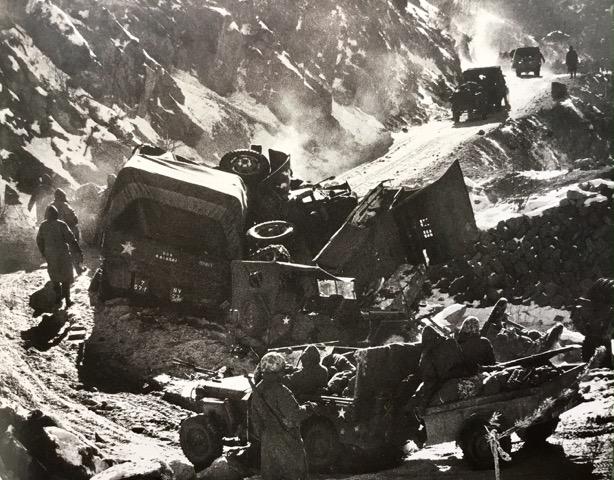
"They closed in steadily on us. There was no rush, no storming our positions. We kept knocking them down like ducks in a shooting gallery but they kept coming." - Marine SSgt James Nash
Chosin: Hellfire Valley
Throughout the horrific night of November 29, 1950, Major John "Jack" McLaughlin and his men fought off wave after wave of Chinese attackers at “Hellfire Valley,” a mile-long, narrow sliver of road, bordered by steep mountains, south of the Chosin Reservoir. Moving from one fighting position to another during the orgy of death, destruction, and hand-to-hand combat, McLaughlin distributed ammunition, directed fire, reassured the wounded, and motivated his men to continue fighting.
Despite his unit’s heroic efforts, however, by 0400 less than half of the 135-man force was still able to fight. The rest were wounded, dead, or dying. To make matters worse, the survivors were running out of ammo and totally surrounded. There was little they could do but hope for a miracle and watch as their wounded buddies bled and froze to death.
As the senior officer, McLaughlin, a 32-year-old combat-decorated World War II Marine, knew his men were looking to him for a way out. The next Chinese assault, he feared, would almost certainly mean the death of every soldier, Marine, and British Royal Commando in his unit.
Surrender - Or Else
Just as the enemy seemed ready for a final attack, the Chinese stopped firing and sent a captured American forward with a message: Surrender.
What happened next became "a nugget of Chosin lore," as Martin Russ calls it in Breakout. McLaughlin, in an air of bravado, replied, “Tell them I’m prepared to accept their surrender.”
The Chinese weren’t amused. They gave the American ten minutes to decide. McLaughlin, in hopes that some of his men could escape into the mountains, again tried to buy more time.
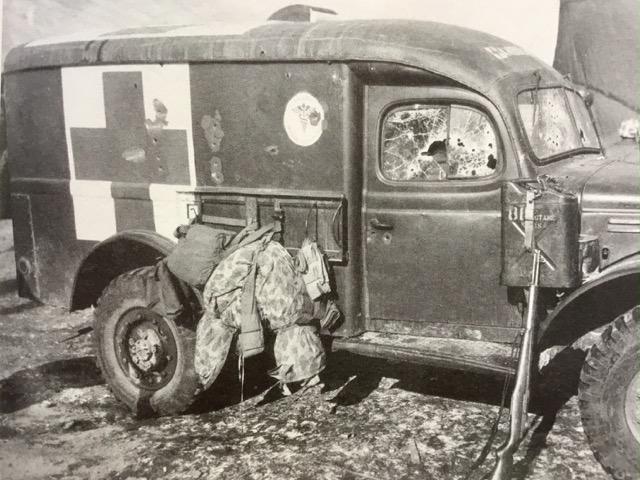
An abandoned US Army ambulance at Hellfire Valley (PC: USMC)
You Have Five Minutes
“I will surrender at 0630, not before. I need time to care for my wounded,” McLaughlin told the Chinese. Losing patience with the brazen Marine from Savannah, Georgia, they responded, “You have five minutes.”
A British Commando with McLaughlin later told Andrew Salmon, author of Scorched Earth, Black Snow, “He [McLaughlin] was a good man. He explained the predicament to everybody . . . and asked me, what do you want to do: Fight to the last, our position being hopeless, or surrender?”
Minutes later, McLaughlin, out of time and options, approached a Chinese line. Handing over his pistol to an enemy officer, he said, “I’m not surrendering because you beat us. I’m surrendering to get our wounded cared for."
The Hole
McLaughlin and the surviving members of his unit were taken prisoner and marched north to POW camps. They spent nearly three years in captivity. Many would die from malnutrition, extreme cold, disease, physical brutality, and torture.
During his initial months in captivity, Chinese officers and fellow prisoners recognized McLaughlin as the camp leader. Communist officials were soon offering him extra food and better living conditions if he cooperated. Refusing, the Chinese beat him, threatened to kill him, and put him in solitary confinement for four months.
In May 1952, Marine aviator Lt. Colonel William G. Thrash, shot down over North Korea and subsequently captured, was sent to McLaughlin’s camp. Thrash also refused to cooperate with the Chinese and was sentenced to eight months in confinement, or "the hole,” as prisoners called it.
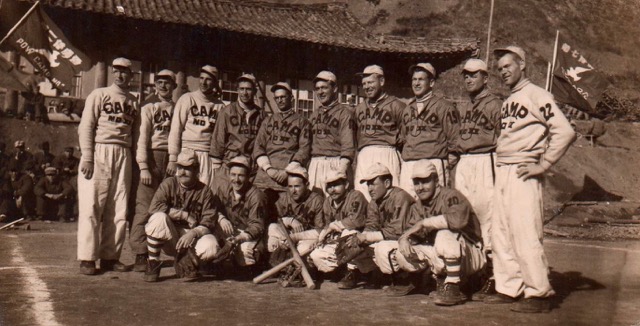
A North Korean "baseball team" propaganda photo of American POWs. The picture was sent to the Communist Party of America. Jack is on far right, standing. (PC: Preston McLaughlin)
Crazy Days
Despite being subjugated to brainwashing, physical abuse, and the constant threat of execution, the two men did everything they could to improve living conditions at the camp. McLaughlin organized athletic events, physical conditioning programs, and “crazy days" to help keep the men motivated.
“Crazy days" were the most popular. Using their imagination and a generous dose of humor, the men would turn the camp basketball court into an "aircraft carrier" and pretend to do flight ops. With their arms out to simulate wings, they would fly over the carrier and make precise – sometimes dramatic - landings on the flight deck.
In another episode that became legendary, the men made a parachute for a dead rat and threw it into the Chinese area of the camp.
The prison was immediately locked down while a Chinese soldier, wearing a surgical mask and looking somewhat intimidated, picked up the dead rodent with a pair of chopsticks and carried it away.
McLaughlin had a way of motivating his men, Thrash told a reporter years later. “He was a tower of strength in the camp. I could not have made it without him.”
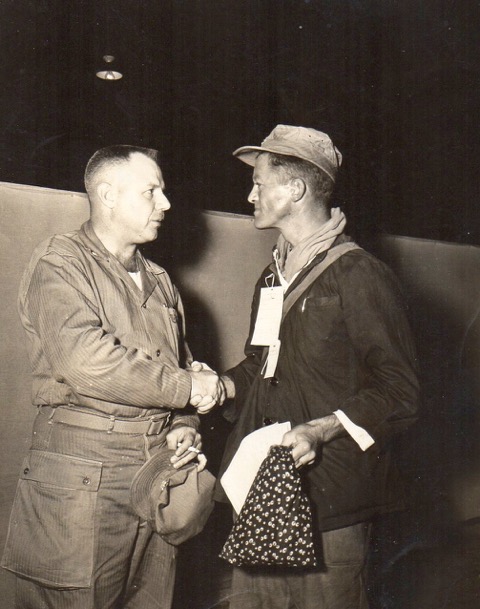
Major McLaughlin (right), 66 lbs. lighter than when he left, being welcomed home on Sept. 5, 1953. (PC: Preston McLaughlin)
Freedom!
On September 5, 1953, McLaughlin, Thrash, and hundreds of other POW’s were released as part of a massive prisoner of war exchange called "Operation Big Switch." After 1,010 days in captivity, McLaughlin and his men were free.
McLaughlin later said that hard work, Marine Corps training, and a strong Catholic faith kept him going during the nearly three years in the Chinese prison.
“Great leaders are born not made,” Thrash said at his best friend’s funeral. “He was a humble man, but a brilliant man and one of the outstanding officers of the Corps. He leaves a wonderful legacy for all Marines to emulate.”
We salute Jack McLaughlin and all the men who were held in captivity during the Korean War. You are not forgotten!
Postscript
Jack McLaughlin spent 36 years in the Marine Corps, retiring as a Lieutenant General. In addition to his time in Korea and WWII, where he received the Silver Star, he also served in Vietnam. He died in 2002 at the age of 83.
According to US officials, 7,245 Americans were held as POW's during the Korean War. At least 2,806 died in captivity.
Thank you to Jack's cousin, retired Marine colonel Preston McLaughlin, for providing pictures and information on Major McLaughlin’s time in Korea. Thank you also to Martin Russ and Andrew Salmon for their respective books that provide invaluable insight and quotes on the Battle of Hellfire Valley.
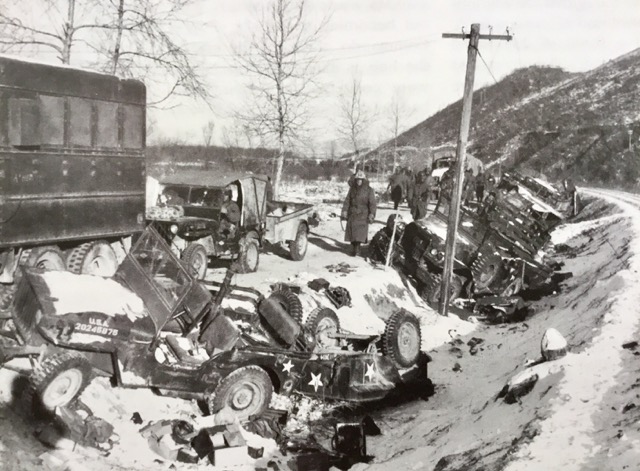
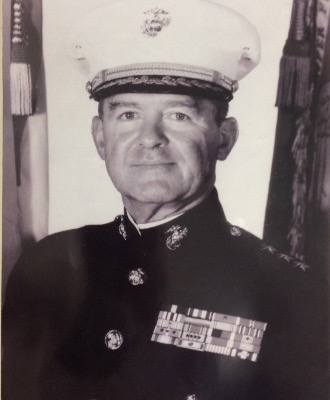
Feature/top photo: Destroyed vehicles at Hellfire Valley (PC: David Douglas Duncan)
I knew both of these Marine Officer’s for most of my life! LtGen John McLaughlin and LtGen. William Gay Thrash Sr. use to tell me all their stories of escape tries, discipline problems, lack of food, North Korean and Chinese confrontations with each other, and comradery among the allied foreign service members in Camp 2. Each had a strong belief in God that kept their will and strength from faltering during those times. I have a letter that was given to my father once they boarded the ship for home, from the officers and men in Camp 2 , thanking both of them for their leadership in keeping the ” troops” alive! Both LtGen McLaughlin and LtGen Thrash served in WWll, Korea, Vietnam and classified operation in south east Asia. Some of your readers may be interested in a Book by Dan King, “The Yalu River Boys” which is about the all the prisoner’s in Camp 2 of the Korean War. His father was in Camp 2 during this period and the book I believe was printed around 2019. I have lots of info on both of these Marine Generals as you can imagine! I am the son of LtGen Thrash and was the Battalion Commander of 1stBn, 10th and retired in 1990. I am an old fart now and glad I came across the info about Gen. McLaughlin. In the last few years a lot of info on these officers is now on the WEB. Just type in their name for all stories!!!!!!
So glad you saw this blog, LtCol. Thrash, and appreciate your taking the time to share these stories.
Your father was a great man and outstanding Marine. I can’t imagine the hardships these men endured.
Thanks also for the book recommendation. I have it downloaded and it’s on my reading list.
I also left the Marines in 1990. I was in for five years and served with 3/8 and 2nd LAI.
Semper Fidelis!
Every story I read or see out of the Chosin Reservoir is amazing and emotional as well. John N. McLaughlin had a huge heart. Sacrificing his freedom to make sure wounded men in his charge were cared for. Kind of reminds me, in a way, of the story about Commander Bucher of the SS Pueblo risking his life, and court martial to free his men from beatings, propaganda, and death threats.
Also I know a former POW, John Erickson, from Lowell MI, who was with the 23rd Inf Regiment, 2nd Inf Div. and was captured not far from the Yalu River, then sent to Camp 5, where he spent 33 months and lost 90 lbs. There is no way I want to see the history, service, and sacrifice of Korean War veterans forgotten.
Thank you, Doug. We really appreciate your reading the blog and offering these heartfelt comments.
All the men who fought and died during the Korean War must always be remembered. They did so much for Korea, America, and the world.
Glad to do my small part in helping to remember and honor them.
Uncle Jack is my godfather, my mother’s brother. I always looked up to him with much admiration. After reading this the admiration just grows. Thank you for this great article. Dan Douglas
Thank you for reading and commenting, Dan. It’s great to hear from members of Gen. McLaughin’s family. Everyone has such a high regard for him -what an inspirational leader! You must be proud to call him your godfather and uncle.
Thanks for a great read! Jack was my much loved and admired uncle. It’s wonderful to see he is still remembered by his fellow Marines.
Thanks so much, Amanda. We appreciate your reading the post and commenting.
You and your family must be so proud of Jack’s incredible legacy. It was an honor to write about him and help share his story.
He will always be remembered by his fellow Marines. Semper Fidelis!
As a Marine, this story of this courageous leader touched me deeply. It was my honor to have met LtCol Thrash once, I regret I never got a chance to met LtGen McLaughlin. I do remember his name as I served in Vietnam also.
Thank you for bringing this story. It’s a tribute to all Marines who fought through that hell. God blezz them all.
One of my DIs was a veteran of “the Chosin Frozen” as well and shared some stories of the hell and heroism of that war.
Thanks for reading the blog and commenting, Joe. It seems like these two Marines made an impact on everyone they met and even those they didn’t meet. We’ve received so much feedback about them in the past few days.
The Marine Corps prides itself on developing leaders, and these two men are a fine example of that.
Thanks for your service and Semper Fi!
I would like to thank all our wonderful brave military Men and women who served in this war. God Bless them and God Bless their souls. It breaks my heart when I think of all the Americans, (who died or was wounded, either fighting the enemy or at the hands of the enemy, )in some God forsaken camp as prisoners of war. The horror and pain they had to endure I cannot imagine.
Thank you for reading and offering these heartfelt comments, Dee.
As you rightly say, it’s so difficult to imagine what they suffered. We should always remember their sacrifices.
He was commanding General Mcrd San Diego.I was a D.I. And playing football for the base team.Met the General.He even wrote a letter to me about my being missed because of a broken leg before our Globe and Anchor Bowl.Semper Fi!
Thanks for reading the blog and sharing this great story, James. It shows what an amazing leader Gen. McLaughlin was.
Thank you also for your service. Semper Fi!
Another great piece Ned. I remember Operation Big Switch..We (9th Inf Regt) provided some vehicular support to it. I was one of the best days (if there could be such) of my second tour in Korea.
Thanks for reading and commenting, Travis. It’s amazing to think you were there during Operation Big Switch! Would love to hear more about this and will follow up with an email.
Thanks to you and all Korean War veterans for helping save Korea.
I knew both Major McLaughlin and Colonel Thrash in POW Camp 2. Both were highly respected and provided great leadership for the other POWs. Both of these men should be remembered forever.
Thanks so much for reading and commenting, Mr. Funchess. Thanks also for your service and sacrifices during the Korean War. What a great honor to have someone who lived through the horrors of Camp 2 comment on this story. I will be sending you a follow-up email.
Very good read thank you for sharing
Thank you for reading the blog and commenting, Timothy. I appreciate it!